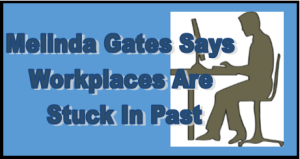Melinda Gates Says Workplaces Are Stuck In Past
 We’re sending our daughters into workplaces designed for our dads, says Melinda Gates.
We’re sending our daughters into workplaces designed for our dads, says Melinda Gates.
And though our workforce has changed dramatically in the last 50 years, our offices are still stuck in the past, she writes in her first-ever LinkedIn post.
“The American workplace was set up based on the assumption that employees had partners who would stay home to do the unpaid work of caring for family and tending to the house,” she writes here. “Of course, that wasn’t always true back then, and it definitely isn’t today.”
The September post was the LinkedIn authorial debut for the philanthropist and co-founder of the Bill and Melinda Gates Foundation. She plans to use that forum to explore ways to “build a 21st-century workplace that lives up to the promise of our 21st-century workforce.”
A World of Change
Gates opens with a powerful image. She describes a 1949 Fortune magazine ad that portrayed three professional men at different career stages: Manager, Vice-President and President. In each illustration, a woman sits beside the boss taking dictation.
“Today, of course, there’d be outrage if an ad like that ran—because the American workforce has changed a lot,” she says. “It’s now 47 percent female, and those women are doing a lot more than taking notes.”
At home, she says everything has changed, with more single parenting, dual-earning households and shared care-giving. It is harder than ever to keep all the balls in the air.
“Yet few workplaces have invested in the kinds of policies that could help fix that—like more affordable childcare, or more flexible hours, or even just a place for moms to pump,” she writes. “Astoundingly, we remain a country where just 15 percent of Americans have access to employer-sponsored paid family leave. In fact, most companies are asking employees to work more.”
She says the greatest pressure is on women and minorities.
“Women continue to shoulder more of the work at home, meaning many can’t dedicate as much time and energy to their jobs, and some drop out of the workforce entirely. And minorities have less access to networks, mentorship, and resources to help them manage mounting responsibilities at work and at home.”
Good Signs for Future
Despite the challenges, Gates sees room for optimism.
“The good news is that the future of work is getting a lot of attention. Researchers, policymakers, and organizations are continuing to explore … how we can make the workplace work better for more Americans.”
She cites two examples:
- Diversity and mentorship programs are opening up new career paths and helping talented workers advance.
- Pro-family policies like paid family and medical leave are helping employees succeed in the prime of their careers.
“But while these are promising opportunities, we also know they’re far from the only ones. And many solutions won’t come from the top down. When it comes to the future of work, it’s clear that we all have a role to play—from better balancing caregiving responsibilities at home, to reimagining office culture from the ground up.”
Follow-up articles from Gates include “Why More Women Are Needed in Computing” and “A Diverse Board is a Better Board.” LinkedIn is owned by Microsoft.
Sources:
- LinkedIn https://www.linkedin.com/pulse/were-sending-our-daughters-workplace-designed-dads-melinda-gates/?trackingId=CpE7B4BtpHsPPny5FeHkOQ%3D%3D
- Business Chicks https://businesschicks.com/melinda-gates-linkedin-column/
- Women’s Agenda https://womensagenda.com.au/latest/melinda-gates-sending-daughters-workplaces-designed-dads/




